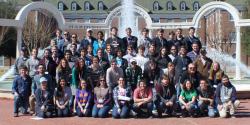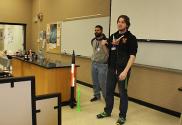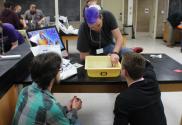Growing as a Community
SPS Zone Meeting
March 4, 2016 to March 5, 2016
Conway, AR
Meeting host: By:Charles Bertram
SPS Chapter:
Introduction
On March 4th and 5th, 2016, the University of Central Arkansas Society of Physics Students had the distinct pleasure of hosting the annual SPS Zone 10 Meeting. Approximately 60 people were in attendance from 9 different schools in the Zone 10 region.
A small committee of UCA SPS members were chosen to plan and prepare for the meeting. The committee, as well as the faculty sponsors of the chapter, started meeting biweekly in the Fall 2015 semester and weekly in the Spring 2016 semester leading up to the meeting. Very early on in the planning process a theme for this year’s meeting was unanimously agreed upon. The theme chosen was: “Growing as a Community”
The Zone 10 Planning Committee spent several weeks brainstorming how to develop a sense of community, a place where various chapters can reach out and have an honest conversation about their strength and shortcomings. A place where they can talk about what they do well, and what they need to improve. UCA SPS established a two-step system to further the theme within the meeting.
Step One: Building a Community
Our meeting began with some down time while the attendees registered. We spent upwards of an hour greeting and welcoming other members and breaking the ice. We offered a wide variety of board games for our guests to play as they got to know each other and local SPS members.
Once the majority of the chapters were in attendance, we sorted everyone into groups of three and four. It was important that group members were complete strangers (initially)—this allowed them to get to know one another as they participated in a series of competitive, team building activities.

The first two activities were engineering design challenges. Groups had to construct a spaghetti tower and float pennies on a boat made of aluminum foil. Each of these activities took around fifteen minutes. In these activities, teams were able to get to know one another and develop a working group dynamic.

The final activity was a competitive demo show. All of the supplies used in the demo show were found at the dollar store or in the university lab rooms (thus ensuring they were common items available to any university). The groups had to name their team, gather materials, and prepare a 2-3 minute demo show within twenty minutes. The shows were judged by the faculty members in attendance using a rubric. Winners of the demo show were given prizes during the after dinner social.
These activities, in addition to dinner and lunch the next day, offered members a chance to mingle and get to know members from other chapters. In a post meeting survey, several members reported:
Having forced collaboration during the breakout sessions was a great way to make everyone talk to strangers, rather than just extroverts. I’d be thrilled to see that become a regular staple of the Zone 10 meetings.
The activities effectively helped establish a sense of comfort within the meeting such that the individuals at the meeting could start growing as a community.
Step Two: Opportunities for Community Growth
Once the sense of community was established, the second step was to give the chapters a chance to learn from one another. This was done over the course of four different activities that are outlined below.

1. Take 5 Presentations and Ice Cream Social: On Friday night, Zone 10 took a play from the Acoustical Society of America’s playbook and held informal presentations using the Take 5 format. Members were encouraged to present anything interesting, not just undergraduate research. It was our hope to foster an environment where individuals who have never presented before could do so in a low pressure, comfortable environment. Additionally, a photo booth was available for silly pictures!
2. Chapter Reports: As per usual at a zone meeting, all chapters were given a chance to present what they’ve been working on in the last year. Chapters were given up to eight minutes to present their chapter’s work and two additional minutes for questions and discussion with the group.
3. Small Group Breakout Sessions: On Saturday we held three breakout sessions. Students were assigned a breakout session when they registered. Each group had a topic we felt was important to helping chapters grow: Fundraising, Outreach, and Local Community Involvement. Each group was moderated by a UCA SPS member. The local member served to keep the talks on topic and facilitate in asking questions and making sure all members got a chance to share their thoughts and opinions about things that came up.
The sessions were helpful for all involved. One student in the outreach session wrote:
We discussed possibly putting together a chapter-wide document of a full list of demos, the equipment required, and explanations in order to make demo shows less of a burden, as well as different ways to reach out to the younger students.
A student from fundraising saw hope for raising funds for a struggling chapter:
I received many helpful ideas on how to get more money for my chapter, including selling 3D printed items.
In general, the meetings allowed members a place to air their frustrations—which were more common than they realized!
In general, it was really validating to hear about similar issues all SPS chapters face (size, attendance) and hear what various people are doing to improve their chapters anyway. It made me feel like our chapter was doing OK since the problems we always think about are common to a lot of other chapters.
Of course, the sessions got a little silly as well:
Dance in the meetings to keep them fun!

4. Career Toolbox: The last activity of the meeting gave attendees the opportunity to walk through SPS National’s Career Toolbox, guided by Dr. William Slaton from UCA. This activity was chosen to allow chapters the chance to take helpful information on professional development back to their home chapters/institutions.
Conclusion
In our post meeting survey we asked: “On a scale of 1-5, how connected did you feel to Zone 10 before and after the meeting?” After the meeting, 85.7% reported feeling connected/very connected to their Zone, compared to 4.8% before.
Members reported feeling that their chapters were validated after seeing that so many chapters face the same issues. Chapters discussed inviting other universities to participate in major events that will be held in the upcoming year. The biggest complaint we received was that Zone members wanted to spend even more time together—a complaint we hope to correct by pushing for more Zone centric events in the future.
Areas of Alignment:



